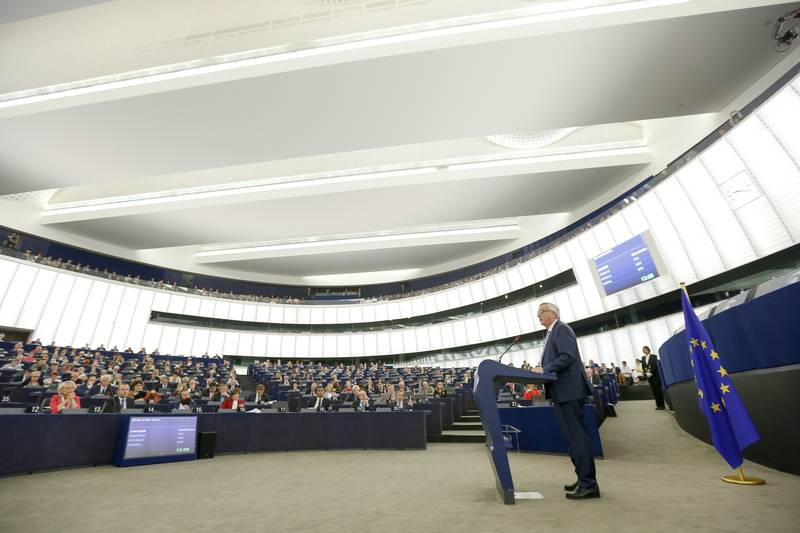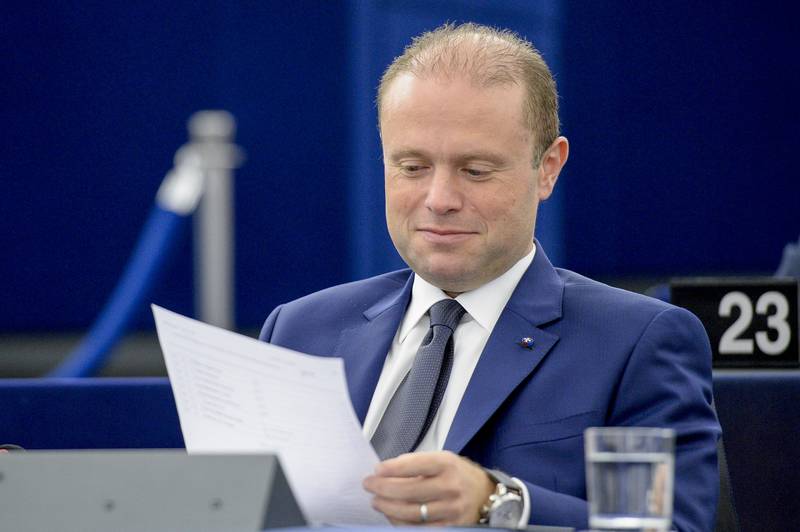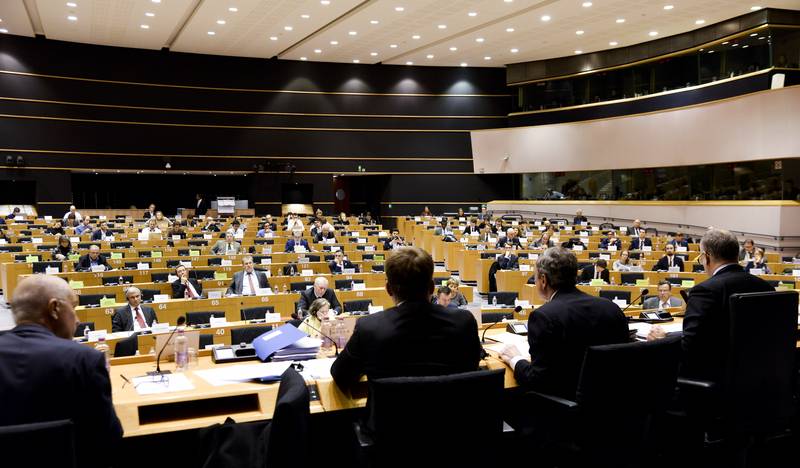Can the European Parliament Become Really European?
Adelina Marini, December 4, 2017
 The European Parliament is one of the main institutions of the European union, often boasting that its members are directly elected by the European citizens, ergo being the most democratically legitimate of them all. With an annual budget of 1.9 billion euros (for 2017), 751 deputies and thousands of staff, the institution is one of the most powerful in the EU. The Treaty of Lisbon made it almost equal in terms of strength with the Council, making it a co-legislator in many areas, including in defining the EU budget. The parliament controls the European Commission and elects its president. The Commission and the Council are required to consult the EP on key issues on the agenda of the Union. Such political power suggests that the EP and its members must be adequately prepared for the task of controlling the other European institutions for the decisions they make.
The European Parliament is one of the main institutions of the European union, often boasting that its members are directly elected by the European citizens, ergo being the most democratically legitimate of them all. With an annual budget of 1.9 billion euros (for 2017), 751 deputies and thousands of staff, the institution is one of the most powerful in the EU. The Treaty of Lisbon made it almost equal in terms of strength with the Council, making it a co-legislator in many areas, including in defining the EU budget. The parliament controls the European Commission and elects its president. The Commission and the Council are required to consult the EP on key issues on the agenda of the Union. Such political power suggests that the EP and its members must be adequately prepared for the task of controlling the other European institutions for the decisions they make.
In the European Tower of Babel, however, this is often not the case. With some vivid exceptions, watching plenary sessions, and sometimes even the meetings of committees is a huge waste of time and resources. Instead of looking for accountability from European leaders, regular dialogues with them often turn to petty European or national politics. The European Parliament's rostrum is often used for personal or party purposes by MEPs, which dramatically decreases the quality of the debates, and questions the need for such a parliament. This has started to become increasingly apparent since the last elections, when the eurosceptic parties occupied much more positions in the institution, and started to dominate the debates.
The problem isn't just with eurosceptics, some of whom come well prepared for debates and present reasonable arguments. Traditional parties are also full of MEPs, who either do not have any meaningful purpose, or appear only as to say another political slogan, often not much related to the topic being discussed and primarily aimed for domestic consumption. The activities of a large number of MEPs are in fact a continuation of national politics. Most are elected in European elections without making the effort to talk about a single pan-European issue, on the wings of the national party that decided to send them to Brussels or Strasbourg.
The European Tower of Babel
For some MEPs, the European Parliament is the place where the national interest has to be protected, for others it is a refuge for second-hand politicians who have become superfluous on national scene or are being used to perform small internal party errands, and sometimes it is a place for recruiting young deserving cadres as assistants or otherwise. For others, the European Parliament is an entrance to national politics - Nigel Farage's case is emblematic in this context. Few are those who work as true supranational MEPs.
Of the EP's annual budget, 44% goes directly for salaries, mainly for the six thousand staff working in the EP and political groups, including for translation. Out of the nearly two billion euros annual budget of the institution, 22% goes to cover costs of MEPs' salaries, trips, offices and salaries of their personal assistants, according to publicly available information.
The gross salary of MEPs (according to data from July 2016) is 8 484 euros. After payment of the European tax and social security contributions, the MEPs are left with 6 611 euros. However, sometimes, national taxes also pass through this amount. In addition to this money, MEPs receive a lump sump for general expenses, which is transfered directly into MEPs accounts. For this year, it amounts to 4 341 euros per month. This sum is for covering costs in MEPs' constituencies, such as office rents, telephone and postal expenses, computers and telephones, organisation of conferences and exhibitions. MEPs who do not regularly attend the plenary sessions (at least half in a year) receive half of this sum.
In October, European public was scandalised by the European Parliament's refusal to provide information on the monthly expenses of the MEPs to a group of investigative journalists, as Politico Europe wrote. Last year, 450 million euros went to salaries for MEPs, travel and office expenses. According to the European Parliament's lawyers, if all information is available, then this will put the MEPs under great pressure, and would end up on Twitter in no time. In this case, MEPs would be censored and wouldn't be able to perform their duties.
 This dense mixture of national, domestic political, European and personal interests finally broke the camel's back on July 4th, 2017, when European Commission President Jean-Claude Juncker (Luxembourg, EPP) burst off and called the MEPs 'ridiculous'. This was during the report [you can choose a language] of the Maltese Prime Minister Joseph Muscat for the achievements during the six-month presidency of Malta this year. The leader of the country which assumed the rotating presidency always appears in EP at the beginning of the the presidency to present its priorities, and when its finished, to report on it. What angered the head of the EC is that the Strasbourg hemisphere was almost empty.
This dense mixture of national, domestic political, European and personal interests finally broke the camel's back on July 4th, 2017, when European Commission President Jean-Claude Juncker (Luxembourg, EPP) burst off and called the MEPs 'ridiculous'. This was during the report [you can choose a language] of the Maltese Prime Minister Joseph Muscat for the achievements during the six-month presidency of Malta this year. The leader of the country which assumed the rotating presidency always appears in EP at the beginning of the the presidency to present its priorities, and when its finished, to report on it. What angered the head of the EC is that the Strasbourg hemisphere was almost empty.
"I cannot believe what is happening in the EP. I commend those who are here in the Chamber, but the fact that only 30 MEPs are here for this debate shows that the EP is not serious. And I must say the following: if Mr Muscat were Ms Merkel or Mr Macron, all MEPs would have been here", Mr Juncker said when his turn to talk came. The Parliament Speaker Antonio Tajani (EPP, Italy) reacted sharply by asking Mr Juncker for more respect. "You can criticise the parliament, but the EC does not control the parliament, it is the EP that controls the Commission", he said. "There are only a few members here to control the Commission. You are ridiculous!", angrily said the head of the Commission, vowing that he would never attend such a meeting again.
Situations such as this with Mr Muscat are a common occurrence in the European Parliament. The regular reports of European Council President Donald Tusk (Poland, EPP) and Jean-Claude Juncker after the end of each EU summit, which often last close to 3 hours, are just as prominent. Extremely rare are the cases when MEPs ask specific questions or make specific criticisms of the decisions voted by the leaders of the member states. In the Chamber, ridiculous and even untrue statements can be heard often, which are a pure torment for the institutional leaders who have appeared.
The plenary debates on Greece's rescue program are also a vivid example of a waste of time. The program itself is never discussed in essence, neither is what exactly has been done by the Greek government, what is not, nor is it discussed what the EC or any of the other institutions responsible for implementing the program have done. These debates usually represent a flood of unsupported statements and ideological clichés.
Somewhat comforting are the deliberations of specific legislation or hearings in the committees, but even in these cases there is often no talk of substance. This is the case, for example, with European Central Bank President Mario Draghi, who appears several times a year for a regular dialogue with the members of the economic committee of the EP. Each hearing has specific topics. The last hearing for example, had two topics, one of which was about the major changes in the bank's monetary policy. This policy has been subject to sharp criticism for years, but MEPs still fail to fulfil their role as a supervising body.
Of all the questions asked during the two-hour hearing, only two were directly related to the ECB's monetary policy and were not very specific, and only one question was related to the second topic of the hearing. Journalists' questions during the monthly press conferences after the meetings of the Governing Council of the ECB are incomparably more specific. Non-governmental organisations, which monitor the work of the ECB, have rung the alarm bells for many years on this. Stanisłas Jourdan, a  campaign manager for one of these NGOs - QE4People - has been following all dialogues with Mario Draghi in the EP's economic committee in the past three years.
campaign manager for one of these NGOs - QE4People - has been following all dialogues with Mario Draghi in the EP's economic committee in the past three years.
His observations are that MEPs' questions are often redundant and focus on national issues instead of what concerns the euro area as a whole. Multilingualism also creates difficulties, he said in his written answers to euinside's questions. The format of the questions and the speaking time are too strict, which does not allow for follow-up questions, which allows Draghi to escape and not get to the bottom of the question asked. Another problem is the fact that the preparatory materials for MEPs are not enough. The list of MEPs who have stated they want to ask questions isn't clear in advance and this makes it difficult for non-governmental organisations to contact relevant MEPs and participate in the preparation of the dialogue.
Stanisłas Jourdan gives an example of similar dialogues in national parliaments. And indeed, the differences are striking. On 10 May 2017, Mario Draghi appeared at a hearing in the financial affairs committee of the Dutch Parliament where he was literally grilled. The dialogue there too went on for two hours, but it was incomparably more intense than any debate in the EP's economic committee. What can be highlighted in the hearing in the Dutch Parliament is that all MEPs spoke English, a much smaller number of MEPs asked questions but there was more time for their questions, and there was room for further enquiries.
Three non-governmental organisations insist that the monetary dialogue with Mario Draghi should change in a way that questions for him are discussed before the hearing; the list of MEPs is published a week earlier; less MEPs speak, but they are allowed to come back with more specific questions, and more flexibility is provided. The three organisations - Positive Money, Transparency International and Bruegel - wrote a letter to Committee Chairman Roberto Gualtieri (Socialists and Democrats, Italy) asking for a meeting to raise the issue of the quality of the monetary dialogue and what could be done to change it. An answer is yet to be received.
The same can be said of the dialogue with the head of the Eurogroup, who regularly gives a report to the MEPs of the same committee. Debates with the EU's High Representative for Foreign and Security Policy are also often pro-forma, and the hearings of national leaders are most disappointing. Especially unpleasant was the case with former Montenegrin Prime Minister Milo Djukanovic, who responded to the invitation of the foreign affairs committee to talk to MEPs on specific national issues. The hearing was scheduled for 8 o'clock in the morning, but the chamber was empty and the prime minister was forced to wait for more than 10 minutes for MEPs to enter.
There was no great benefit of this dialogue, as it was rushed due to the shortened time, there was no opportunity for subsequent questions, and the themes ranged from relations with Russia, through corruption, to accession talks, with having no opportunity to get to the bottom. This practically discourages dialogue. In such a situation, it is also necessary questions to be coordinated in advance (often questions are duplicated), to be considerably fewer, and to allow follow-up questions to reach the maximum depth of a topic. It should not be forgotten that the European Parliament is sometimes the only place where leaders of young democracies, where the rule of law has not yet been established, can be held accountable.
Montenegro is a perfect example. The opposition boycotted the parliament for years; the country has a huge problem with the freedom of speech, where journalists or entire outlets are intimidated, and the murders of journalists to this day have not been resolved. In such a situation, we can hardly imagine proper accountability in the Montenegrin parliament, and the European Parliament is failing to show how it should be done.
A reform of the EP
Next year, the great talk of reforming the European Parliament begins. The issue turned out to be toxic after the leaders of the member states endorsed Donald Tusk's program in October. It includes a special informal summit in February, when the EP's composition will be discussed for the first time. The discussion was provoked by the departure of Britain and the release of 73 seats in the European Parliament. MEPs have already jumped against the European Council and its ambition to interfere in  their affairs, but according to the Lisbon Treaty, the decision on the composition of the EP is taken by the European Council at the initiative and with the consent of the EP.
their affairs, but according to the Lisbon Treaty, the decision on the composition of the EP is taken by the European Council at the initiative and with the consent of the EP.
The EP's reform can be much more than the number of seats if judged by the ambitious European program of French President Emmanuel Macron. In his European speech at the Sorbonne in September, he specifically focused on the EP. His ambition is to put in place a transnational electoral list for the next elections, as over time this will lead to a severance between national and European politics. The EP must, over time, become a strong European institution in which MEPs are supranational. Former British MEP Andrew Duff was rapporteur on the creation of a pan-European electoral list, but there were no political conditions for it at the time, and the idea failed.
In his answers sent to euinside by mail, Mr Duff welcomed Donald Tusk's idea the European Council to hold a discussion on the EP's composition because nothing can be achieved without the Council's agreement. But he thinks that the problems will come from the European Parliament itself, where the progressive forces and the leader of the Liberals Guy Verhofstadt will face great difficulty in overcoming the conservative and nationalistic forces. He believes that the Council should help them in this task together with the Commission. The transnational list will transform the parliament and strengthen its democratic legitimacy. It will make the European elections truly European for the first time, says Andrew Duff.
Until this happens, however, European taxpayers will continue to pay for an institution which only provides a platform for MEPs, whose only purpose is to ruin the EU and its value system, while at the same time being toothless in its core function of seeking accountability from the decision-makers, and when it itself refuses accountability on how European money is spent.
 Federica Mogherini | © Council of the EU
Federica Mogherini | © Council of the EU | © Council of the EU
| © Council of the EU Luis De Guindos | © Council of the EU
Luis De Guindos | © Council of the EU